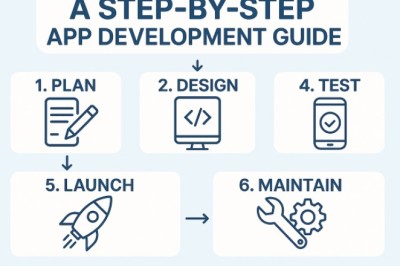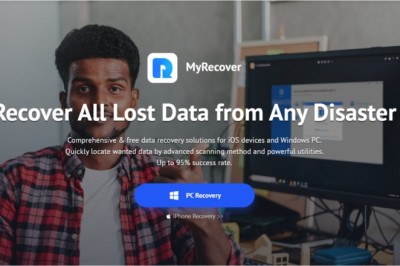views
Automation in finance. Most might ask “What is that?”.
The abysmally low awareness about financial automation is not your fault. It is a relatively new field of technology that is fast gaining pace.
After all, businesses, want to increase their productivity and efficiency.
The end goal is profit for all businesses and financial automation lets you do that.
If you believe in only facts then Deloitte’s Automation Survey might make it seem like a more attractive option. The survey found that covid lockdowns forced companies to shift to remote financial operations.
This consequently led to a rise in the use of robotic process automation (RPA), with a whopping 78 per cent of participants stating their prior exposure to the technology.
Here Are 9 Reasons Why Your Business Needs a Financial Automation Plan
#1 Optimizes Working Capital
Any business runs on good cash flow. It can be calculated by excluding the company’s liabilities.
Keeping track of this is a tedious task and automating the inflow and outflow can also help you save something more precious than money - Time.
#2 Saves Money
Following a financial automation plan can be an expensive affair- agreed.
But do not forget that it is a one-time investment. On acquiring any software tool, you are free from any financial subscriptions for a long time.
Also, of course, buying software will cost you much lesser than hiring accountants to do the same work. After all human effort comes with the dignity of labour for minimum pay that can cost you high.
#3 Eliminates Human Error
Human errors are unavoidable. It is in our very nature to commit mistakes which is ok. Yet human error in finances can cost the company big, which has made many firms go bankrupt within a short period.
Automating finances, with mobile testing, especially bulk payouts can help you track the transfers with utmost transparency (which btw may not be entirely seen with employees in some cases).
#4 Boosts Efficiency
You might've started with the thought “to work like a machine”. But humans can only do so much.
Hence, depending on financial automation for corporate functioning is a wise move.
Automated software work 24/7. All you have to do is put the time and energy you saved here in some other more productive place.
You needn’t worry about
- Generating invoices
- Manual maker checkers
- Payment approvals
#5 Helps Access Top-Notch Data Sets
As ironic as it may seem in this tech-driven world, the pure form of a solid database is hard to come by.
Automating your accounting software can help you curate the most accurate database for current and future references. Trial balances can be extracted anytime, anywhere.
You get to keep your financial statements up to date, even as you collate data without breaking a sweat.
#6 Protects You From Fraud
In a world where we have started to almost believe “privacy is a myth”, financial automation reinstates our faith in technology.
Fraud transactions are a common occurrence. It is tempting to reduce dependability on financial automation, for this very reason.
But fear not, for counter-technology has been on the rise to ensure data security is considered on a first-priority basis. For instance, neobanks like Karbon in India have a two-factor authentication system in place to drive corporate credit transactions.
As a result, the cons of depending on non-automated processes far outweigh the pros that come with automation.
#7. Automates Tax Filing
We all know that a business’s profit or loss cycle is risky and changes with each quarter. So will the tax filing calculations. Many struggle to file their taxes sometimes, simply because it is too complex. Automated accounting comes in handy when you need to maximize deductions and streamline the process.
#8 Gain Transparency
This is especially beneficial for big corporates where the entire financial ecosystem can be accessed by any team leader at any point in time.
You gain insights, with cross-functional data sets that reveal the pain points of each department and the organisation as a whole.
#9 Team Collaboration
Digital mode of operations will help collaborate with people from other departments to envision bigger goals for the company and re-strategize methods.
How to Facilitate Finance Automation
You are truly spoilt for choice when it comes to choosing the right tools. All you have to keep in mind is your end goal and the financial structure you wish to design for your company.
1. Identify Processes That Need Automation
The volume of documents that need to be handled varies from company to company. So it is wise to first explore the systems available in the market.
Correlate these tools to your existing needs and then make an informed decision based on your research.
2. Ask Yourself the Following to Be Certain:-
- Is increasing the financial team’s productivity the goal?
- Do you wish to have an in-depth analysis of the taxes?
- Which part of accounting requires automation- tax payment, bulk payment, vendor payment etc?
Considering the present post-covid era, there is an obvious bias towards digital payments and automation. Once you establish where you need automation, you can identify how to use it.
3. Consider Automating the Following Processes:-
● Investment Applications
● Expenditure Forecasts
● Invoice Workflow
● CapEx requests
● Accounts Receivable System
● Annual Accounts Audit
● Better Automated Workflow
4. Look Out for the Right Tech
1. RPA — Robotic Process Automation
RPA is based on artificial intelligence, Use of intelligent bots is all the rage amongst businesses to redirect manual tasks.
2. Machine Learning
This is mainly used for forecasts and in-depth research analysis. For instance, historical evidence of past transactions can help businesses paint a clear picture of a pattern in spending.
The marketing budget can also be drastically slashed by allowing automated chatbots to take over conversational tasks.
5. Train Your Staff Well
Irrespective of state fo the art infrastructure and tech-driven financial operations in place, nothing will work if your finance team doesn’t know how to tap it. So use this opportunity to train them right and train them well.
Bottom Line
Irrespective of tech-driven your finance team is, do not lose sight of your goal - enhancing financial efficiency.
Take feedback and constantly seek to align your goals with automated technology.
Collaboration is the best way forward.


























Comments
0 comment